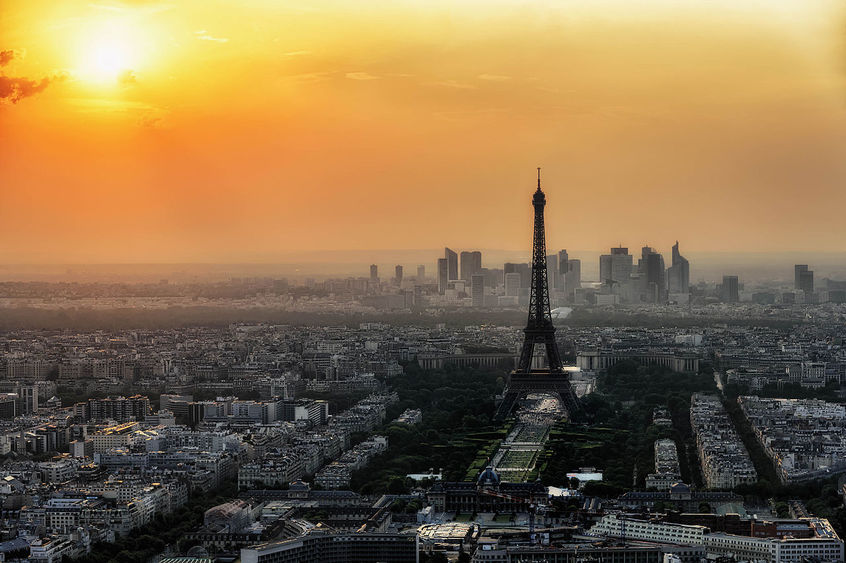A global body representing more than a million architects in 120-plus countries has criticised Donald Trump’s decision to pull the US out of the Paris climate accord, and has vowed to continue reducing emissions through sustainable design.
“We will not accept a future in which rising sea levels destroy more communities,” pledged Esa Mohamed, president of the International Union of Architects (UIA) on 1 June, the same day the president declared his decision.
The UIA joined the American Institute of Architects (AIA), whose president Thomas Vonier said US architects would use their skills “to mitigate the harm this decision will do to our economy and to America’s stature across the globe”.
British architects weighed in as well, with Jane Duncan, president of the Royal Institute of British Architects (RIBA) saying Trump’s move was “one of the most regressive decisions of our time”.
Disputed claims
The Paris agreement was negotiated in the French capital on 12 December 2015; since then it has been signed by 195 countries. It broadly commits signatories to do what they can to help keep the global average temperature below 2°C above pre-industrial levels, and to lower greenhouse gas emissions.
We will not accept a future in which rising sea levels destroy more communities– Esa Mohamed, International Union of Architects
Announcing his decision on 1 June, President Trump claimed the Paris accord “cost the US economy nearly $3 trillion in reduced output, over 6 million industrial jobs, and over 3 million manufacturing jobs”. These claims and others made in a speech that day have been widely disputed.
Trump objected to former president Obama committing $3bn to the Green Climate Fund without authorisation from Congress, and said the accord gave “countries like China a free pass for years to come” on emissions.
The White House also cited MIT research showing the Paris accord’s impact on the climate would be “negligible” because it is likely to reduce global temperature rise by just 0.2°C by 2100. MIT hit back the following day, saying the statement was misleading and calling the Paris accord “unprecedented and vital”.
Embracing responsibility
In response to Trump’s decision the UIA, which represents professional bodies in 124 countries and territories encompassing 1.3 million architects, said more energy efficiency in buildings was necessary for reducing emissions.
The Paris agreement was negotiated in the French capital on 12 December 2015; since then it has been signed by 195 countries. It broadly commits signatories to do what they can to help keep the global average temperature below 2°C above pre-industrial levels, and to lower greenhouse gas emissions.
Announcing his decision on 1 June, President Trump claimed the Paris accord “cost the US economy nearly $3 trillion in reduced output, over 6 million industrial jobs, and over 3 million manufacturing jobs”. These claims and others made in a speech that day have been widely disputed.
Trump objected to former president Obama committing $3bn to the Green Climate Fund without authorisation from Congress, and said the accord gave “countries like China a free pass for years to come” on emissions.

Paris skyline: The Paris climate accord was negotiated in Paris on 12 December 2015; 195 countries have signed (Joe deSousa/CC 1.0)
The White House also cited MIT research showing the Paris accord’s impact on the climate would be “negligible” because it is likely to reduce global temperature rise by just 0.2°C by 2100. MIT hit back the following day, saying the statement was misleading and calling the Paris accord “unprecedented and vital”.
Embracing responsibility
In response to Trump’s decision the UIA, which represents professional bodies in 124 countries and territories encompassing 1.3 million architects, said more energy efficiency in buildings was necessary for reducing emissions.
“Urban areas account for more than 70% of global energy consumption and CO2 emissions, mainly from buildings,” said Esa Mohamed in a statement. “Architects embrace the responsibility to design buildings and communities that reduce greenhouse gas emissions; foster healthier environments; protect and enhance natural resources; provide clean air and water; protect people from the impacts of climate change; and create sustainable, equitable and healthy communities for everyone.”
He added: “We will not accept a future in which rising sea levels destroy more communities; where devastating natural disasters become the norm; where future generations face greater risk of drought; and where disease and poverty are exacerbated by the extreme impacts of a changing climate.”
In the US, the AIA pledged ongoing commitment to climate change mitigation “with or without the support of the United States government”.
“The United States must remain a leader in the battle to cease harmful and needless practices that damage the planet and its climate, acting out of both environmental concerns and national economic interests,” said AIA President Thomas Vonier in a statement on 1 June. “Instead of helping our economy, as the Administration contends, withdrawing from the Paris Agreement will put us behind our major global competitors.”
In the UK, RIBA President Jane Duncan said: “Backing out of the Paris agreement represents one of the most regressive decisions of our time. To give up on tackling climate change is to give up on the prospects for future generations all around the world.
“Stopping climate change can only be achieved as part of a global and committed community.”
The fallout from Trump’s controversial decision continues. Today news emerged that the Acting US ambassador to China, David Rank, has resigned from his post in Beijing over the matter, reports CNN.
Although Trump’s promise to withdraw from the agreement drew cheers at his campaign stump speeches, the move appears unpopular with the general US public: 59% of people oppose the move and only 28% support it, according to a Washington Post-ABC News poll.
Top image: US President Donald Trump (White House)
Further Reading:






